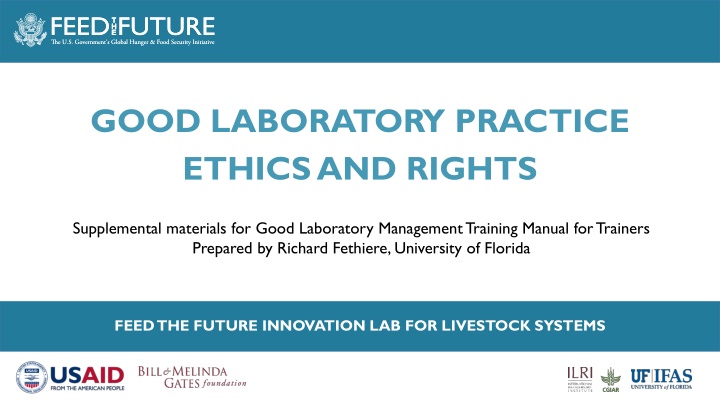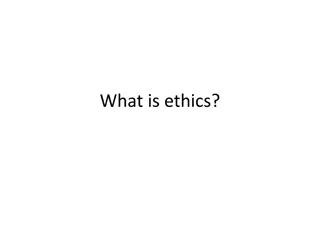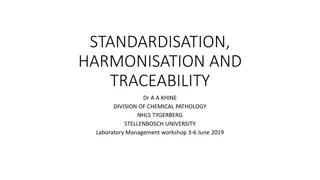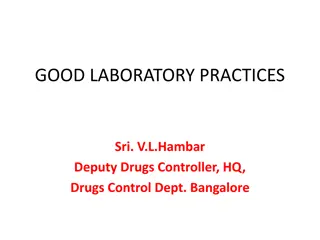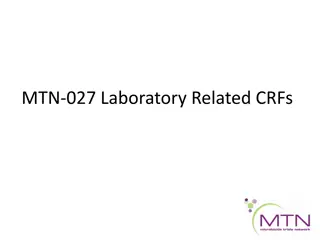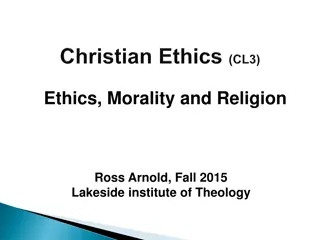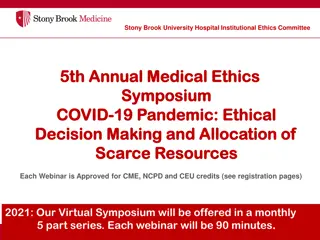Good Laboratory Practices and Ethics Overview
This material provides insightful guidance on good laboratory practices, ethics, and rights, essential for individuals involved in laboratory management and training. Covering topics such as compliance with animal welfare legislation, quality assurance, test systems characterization, research requirements matching, and more, this content serves as a valuable resource for ensuring proper laboratory management. The detailed information and images offer a comprehensive understanding of the best practices and ethical considerations in laboratory settings.
Download Presentation

Please find below an Image/Link to download the presentation.
The content on the website is provided AS IS for your information and personal use only. It may not be sold, licensed, or shared on other websites without obtaining consent from the author.If you encounter any issues during the download, it is possible that the publisher has removed the file from their server.
You are allowed to download the files provided on this website for personal or commercial use, subject to the condition that they are used lawfully. All files are the property of their respective owners.
The content on the website is provided AS IS for your information and personal use only. It may not be sold, licensed, or shared on other websites without obtaining consent from the author.
E N D
Presentation Transcript
GOOD LABORATORY PRACTICE ETHICS AND RIGHTS Supplemental materials for Good Laboratory Management Training Manual for Trainers Prepared by Richard Fethiere, University of Florida FEED THE FUTURE INNOVATION LAB FOR LIVESTOCK SYSTEMS Photo Credit Goes Here
CHARACTERIZATION: TEST SYSTEMS Animals GLP compliance Compliance with animal welfare legislation
CHARACTERIZATION: TEST SYSTEMS Researchers must match quality and quantity to research requirements of the study Phenotype / genotype Sex, age Supplier Quantity Study director defines: Animals Reason for choice Protocol / Study Plan
CHARACTERIZATION: TEST SYSTEMS Species / Strain Health status Supplier Animals Background data Separation
CHARACTERIZATION: TEST SYSTEMS Follow national regulations Routine checks on: Rooms: Cleaning Cages / racks: Cleaning, changes Food / water Environmental parameters Temperature Animals - Husbandry Document checks Document deviations from SOP
CHARACTERIZATION: TEST SYSTEMS Animals Group assignment How to assign groups per protocol, before dosing Maintain data used for grouping Log rack / cage location if applicable Document all cases of disqualification
CHARACTERIZATION: TEST SYSTEMS Animals Identification Must be identified o During acclimation o During study Large animals individual ID marks throughout Small animals o Label cages during acclimation o Individuals ID on all data Regular ID check
CHARACTERIZATION: TEST SYSTEMS Animals Acclimation Length depends on species / protocol Health check at specified times Document preparation / approval of study room
CHARACTERIZATION: TEST SYSTEMS Animals Reception Inspect upon arrival o Health/sex o Number/delivered/ordered o Weight/age Record receipt and any deviations from specifications Check against protocol requirements Store in clean room
CHARACTERIZATION: TEST SYSTEMS Animals Supplies / Delivery It is important to build up a partnership relationship with the animal supplier Assess quality by supplier qualification Usually by researcher = Quality Assurance Maybe by Quality Assurance Society Apply same to bedding and animal feed Keep order form, supplier s invoice, transport certificates, etc., as raw data
CHARACTERIZATION: TEST SYSTEMS Animals Environment GLP says study report must contain a description of all circumstances that may have affected the quality or integrity of data Environmental conditions belong to these circumstances
Consult the Good Laboratory Management Training Manual for Trainers https://livestocklab.ifas.ufl.edu/resources/glp/ Direct link to manual in PDF: https://livestocklab.ifas.ufl.edu/media/livestocklabifasufledu/pdf- /MANUAL-Fethiere_UF_Good-lab-management-practices_2022.pdf
Feed the Future Innovation Lab for Livestock Systems https://livestocklab.ifas.ufl.edu/ (Subscribe to newsletter) livestock-lab@ufl.edu Disclaimer This work was funded by the United States Agency for International Development (USAID) Bureau for Food Security under Agreement #AID-OAA-L-15-00003 as part of Feed the Future Innovation Lab for Livestock Systems, and by the Bill & Melinda Gates Foundation OPP#1175487. Any opinions, findings, conclusions, or recommendations expressed here are those of the authors alone.
